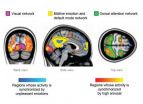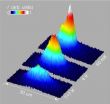(Press-News.org) The hordes of bark beetles that have bored their way through more than six billion trees in the western United States and British Columbia since the 1990s do more than kill stately pine, spruce and other trees.
Results of a new study show that these pests can make trees release up to 20 times more of the organic substances that foster haze and air pollution in forested areas.
A paper reporting the findings appears today in the journal Environmental Science & Technology, published by the American Chemical Society.
Scientists Kara Huff Hartz of Southern Illinois University Carbondale, Gannet Hallar of the Desert Research Institute's Storm Peak Laboratory in Steamboat Springs, Colo., and colleagues say that western North America is experiencing a population explosion of mountain pine beetles, a type of bark beetle that damages and kills pines and other trees.
The beetles bore into the bark of pine trees to lay eggs.
Gases called volatile organic compounds (VOCs) are released from the bore holes, which act as defense mechanisms against the beetles.
VOCs, however, also contribute to the smog and haze that obscures views of natural landscapes in U.S. national parks and other natural areas where tourists flock in summer.
"These results highlight one of the many potential feedbacks due to aerosols, which continue to be the greatest challenge to improving predictive models for air quality, visibility and climate," says Alex Pszenny, program director in the National Science Foundation's Division of Atmospheric and Geospace Sciences, which funded the research.
To determine how beetle attacks affect the atmosphere, the researchers measured VOC levels in the air near healthy and infected pine trees.
They found that beetle-infested trees release up to 20 times more VOCs than healthy trees near the ground surface.
The predominant type of VOC released by trees was called ß-phellandrene.
The data suggest that the bark beetle epidemic in the western United States could have led to higher concentrations of organic compounds in the air, which may contribute to haze.
The haze, say the scientists, may in turn harm human health, reduce visibility and affect climate.
INFORMATION:
Other authors of the paper are Hardik Amin and Aaron Brown of Southern Illinois University Carbondale; P. Tyson Atkins of the Desert Research Institute; Rachel Russo of the University of New Hampshire; and Barkley Sive of Appalachian State University in Boone, N.C.
Beetle-infested pine trees contribute to air pollution and haze in forests
Popular summer tourist destinations may 'see' the effects
2012-05-28
ELSE PRESS RELEASES FROM THIS DATE:
Feeling strong emotions makes peoples' brains 'tick together'
2012-05-28
Experiencing strong emotions synchronises brain activity across individuals, research team at Aalto University and Turku PET Centre in Finland has revealed.
Human emotions are highly contagious. Seeing others' emotional expressions such as smiles triggers often the corresponding emotional response in the observer. Such synchronisation of emotional states across individuals may support social interaction: When all group members share a common emotional state, their brains and bodies process the environment in a similar fashion.
Researchers at Aalto University and ...
Dramatic increase in fragility fractures expected in Latin America
2012-05-28
The International Osteoporosis Foundation (IOF), in cooperation with medical and patient societies from throughout Latin America, has today published a landmark report which compiles osteoporosis-related data on 14 countries and the region as a whole. The report shows that fragility fractures due to osteoporosis are predicted to more than double in some countries in the coming decades.
Osteoporosis, which literally means 'porous bones', is a disease which causes bones to become fragile and more likely to break. Older adults, and post-menopausal women in particular, are ...
In Brazil number of hip fractures expected to increase 32 percent by 2050
2012-05-28
A new Audit report on fragility fractures, issued today by the International Osteoporosis Foundation (IOF), predicts that Brazil will experience an explosion in the number of fragility fractures due to osteoporosis in the coming decades.
Osteoporosis, a disease which weakens bones and makes them more likely to fracture, is thought to affect around 33% of postmenopausal women in Brazil. Fractures due to osteoporosis mostly affect older adults, with fractures at the spine and hip causing the most suffering, disability and healthcare expenditure.
Currently, about 20% ...
Food, water safety provide new challenges for today's sensors
2012-05-28
Sensors that work flawlessly in laboratory settings may stumble when it comes to performing in real-world conditions, according to researchers at the Department of Energy's Oak Ridge National Laboratory.
These shortcomings are important as they relate to safeguarding the nation's food and water supplies, said Ali Passian, lead author of a Perspective paper published in ACS Nano. In their paper, titled "Critical Issues in Sensor Science to Aid Food and Water Safety," the researchers observe that while sensors are becoming increasingly sophisticated, little or no field ...
Exotic particles, chilled and trapped, form giant matter wave
2012-05-28
Physicists have trapped and cooled exotic particles called excitons so effectively that they condensed and cohered to form a giant matter wave.
This feat will allow scientists to better study the physical properties of excitons, which exist only fleetingly yet offer promising applications as diverse as efficient harvesting of solar energy and ultrafast computing.
"The realization of the exciton condensate in a trap opens the opportunity to study this interesting state. Traps allow control of the condensate, providing a new way to study fundamental properties of light ...
Healing the voice: New American Chemical Society video on synthetic vocal cords
2012-05-28
WASHINGTON, May 24, 2012 — An effort to develop synthetic vocal cords to heal the voices of people with scarred natural vocal tissues is the topic of the latest episode of the American Chemical Society's (ACS') Bytesize Science series. The video is available at www.BytesizeScience.com.
Filmed in the lab of 2012 ACS Priestley Medalist and David H. Koch Institute Professor Robert S. Langer, Ph.D., at the Massachusetts Institute of Technology, the video highlights the development of a flexible polymer material that mimics the traits of human vocal cords. The video begins ...
London researcher calls for new approach to regulating probiotics
2012-05-28
LONDON, ON – In today's Nature scientific journal Dr. Gregor Reid, Director of the Canadian R&D Centre for Probiotics at Lawson Health Research Institute and a scientist at Western University, calls for a Category Tree system to be implemented in the United States and Europe to better inform consumers about probiotics.
Globally, the market for probiotics (beneficial microorganisms) exceeds $30 billion; however, consumers have little way of knowing which products have been tested in humans and what they do for health. Furthermore, the regulatory system in the US maintains ...
Exercise does not improve lipoprotein levels in obese patients with fatty liver disease
2012-05-28
New research found that moderate exercise does not improve lipoprotein concentrations in obese patients with non alcoholic fatty liver disease (NAFLD). Results published in the June issue of Hepatology, a journal of the American Association for the Study of Liver Diseases, report that moderate physical activity produces only a small decrease in triglyceride and alanine transaminase (ALT) levels.
Obesity is a rampant health concern worldwide. In fact, the World Health Organization (WHO) reported in 2008 that 1.5 billion people, age 20 and older, were overweight, and of ...
NTU and I²R scientists invent revolutionary chipset for high-speed wireless data transfer
2012-05-28
Here is a new microchip that can transfer data the size of 80 MP3 song files (or 250 megabytes) wirelessly between mobile devices, in the flick of a second.
Or how about transferring a typical 2-hour, 8-gigabyte DVD movie in just half a minute compared to 8.5 hours on Bluetooth?
Such unprecedented speeds on the wireless platform are now a reality as scientists from the Nanyang Technological University (NTU) and A*STAR's Institute for Infocomm Research (I²R) have developed a revolutionary microchip that can transmit large volumes of data at ultra-high speeds of 2 Gigabits ...
Business students better equipped to evaluate peers
2012-05-28
Montreal, May 24, 2012 – Peer evaluation is a touchstone of many business school classes. But does the process of rating the work of one's classmates really shape better businesspeople? A new study from Concordia's John Molson School of Business, published in the journal of the Academy of Management Learning and Education, answers that question with a resounding yes.
Stéphane Brutus, Professor and Chair of the Department of Management, undertook the research that led to these findings after developing a standardized online peer evaluation system, or PES, in 2004. To ...
LAST 30 PRESS RELEASES:
Weight-loss wonder pills prompt scrutiny of key ingredient
Nonprofit leader Diane Dodge to receive 2026 Penn Nursing Renfield Foundation Award for Global Women’s Health
Maternal smoking during pregnancy may be linked to higher blood pressure in children, NIH study finds
New Lund model aims to shorten the path to life-saving cell and gene therapies
Researchers create ultra-stretchable, liquid-repellent materials via laser ablation
Combining AI with OCT shows potential for detecting lipid-rich plaques in coronary arteries
SeaCast revolutionizes Mediterranean Sea forecasting with AI-powered speed and accuracy
JMIR Publications’ JMIR Bioinformatics and Biotechnology invites submissions on Bridging Data, AI, and Innovation to Transform Health
Honey bees navigate more precisely than previously thought
Air pollution may directly contribute to Alzheimer’s disease
Study finds early imaging after pediatric UTIs may do more harm than good
UC San Diego Health joins national research for maternal-fetal care
New biomarker predicts chemotherapy response in triple-negative breast cancer
Treatment algorithms featured in Brain Trauma Foundation’s update of guidelines for care of patients with penetrating traumatic brain injury
Over 40% of musicians experience tinnitus; hearing loss and hyperacusis also significantly elevated
Artificial intelligence predicts colorectal cancer risk in ulcerative colitis patients
Mayo Clinic installs first magnetic nanoparticle hyperthermia system for cancer research in the US
Calibr-Skaggs and Kainomyx launch collaboration to pioneer novel malaria treatments
JAX-NYSCF Collaborative and GSK announce collaboration to advance translational models for neurodegenerative disease research
Classifying pediatric brain tumors by liquid biopsy using artificial intelligence
Insilico Medicine initiates AI driven collaboration with leading global cancer center to identify novel targets for gastroesophageal cancers
Immunotherapy plus chemotherapy before surgery shows promise for pancreatic cancer
A “smart fluid” you can reconfigure with temperature
New research suggests myopia is driven by how we use our eyes indoors
Scientists develop first-of-its-kind antibody to block Epstein Barr virus
With the right prompts, AI chatbots analyze big data accurately
Leisure-time physical activity and cancer mortality among cancer survivors
Chronic kidney disease severity and risk of cognitive impairment
Research highlights from the first Multidisciplinary Radiopharmaceutical Therapy Symposium
New guidelines from NCCN detail fundamental differences in cancer in children compared to adults
[Press-News.org] Beetle-infested pine trees contribute to air pollution and haze in forestsPopular summer tourist destinations may 'see' the effects


